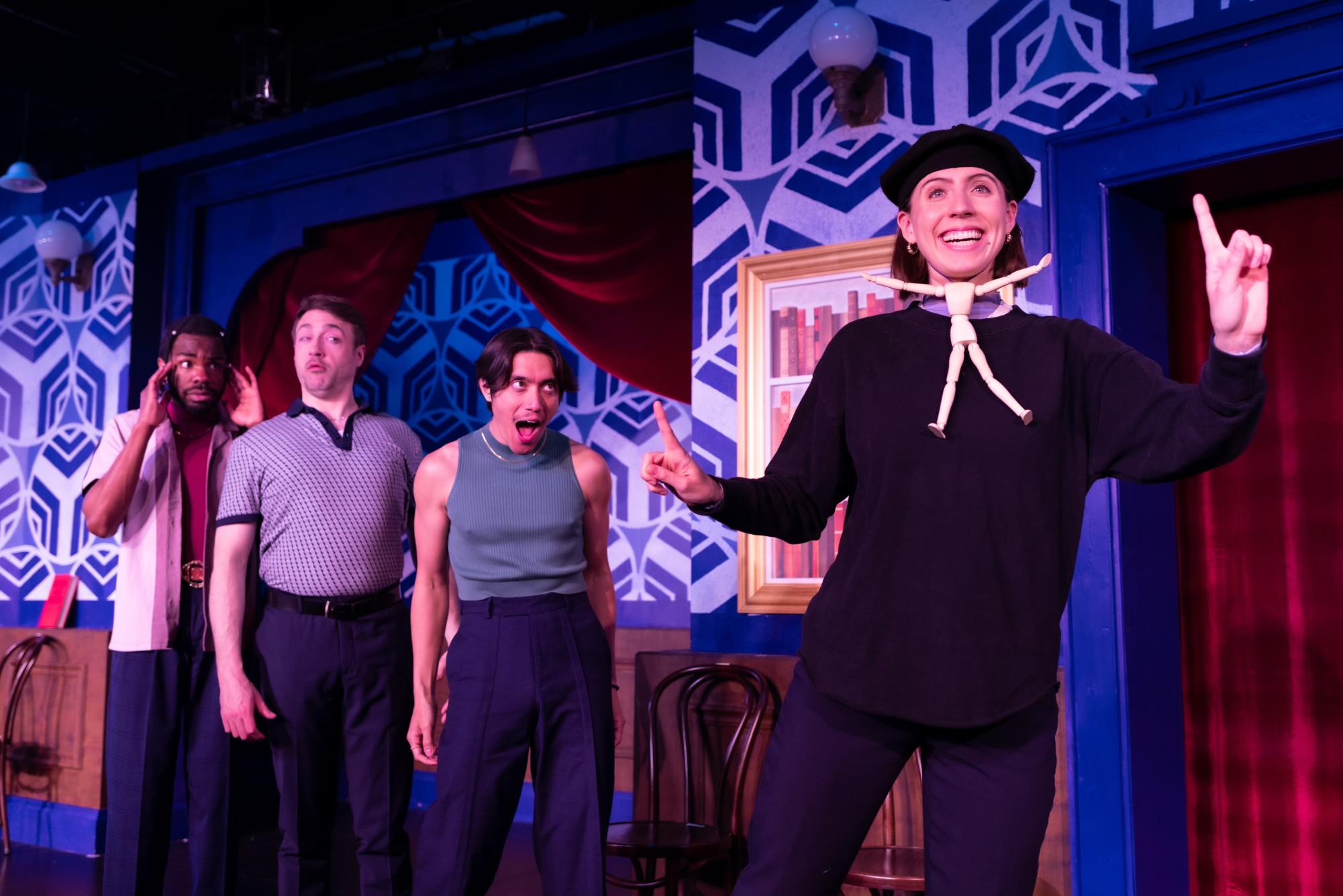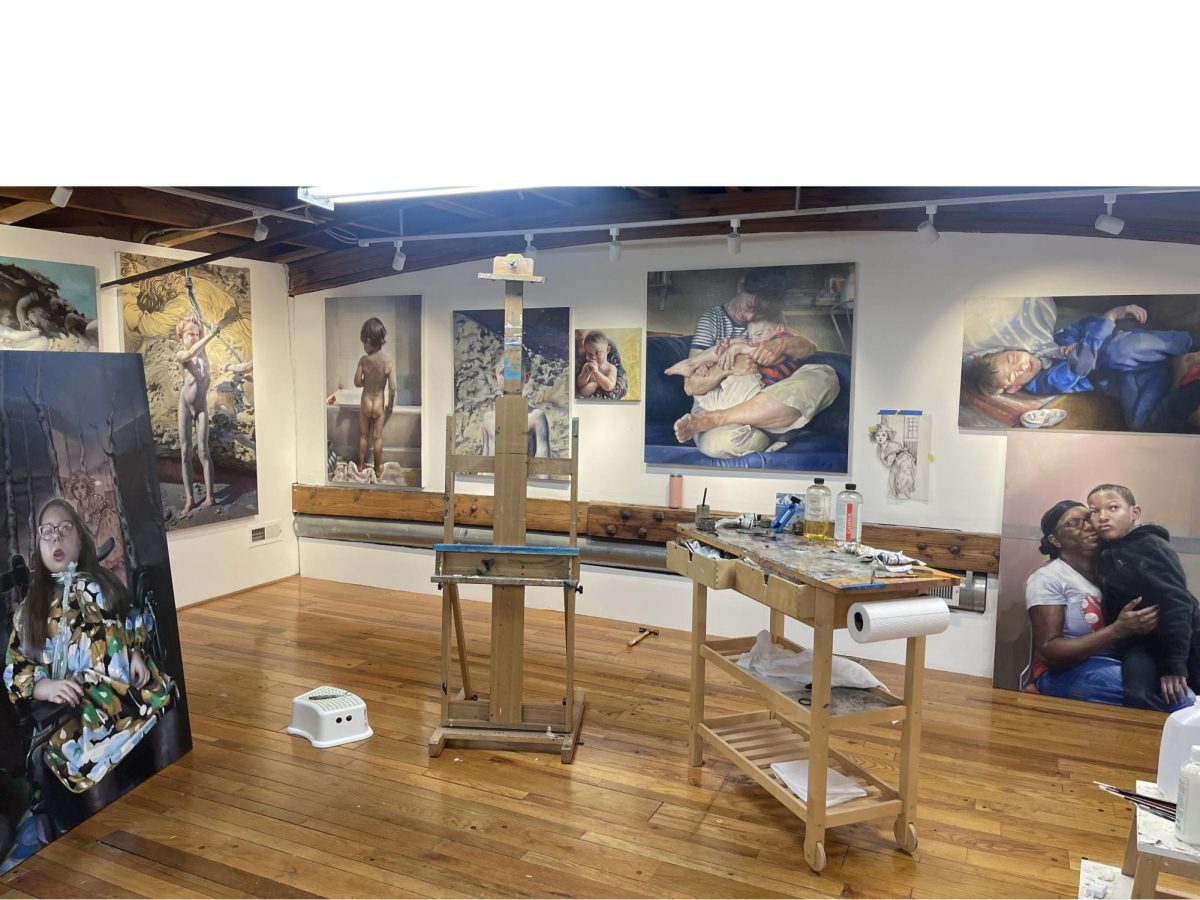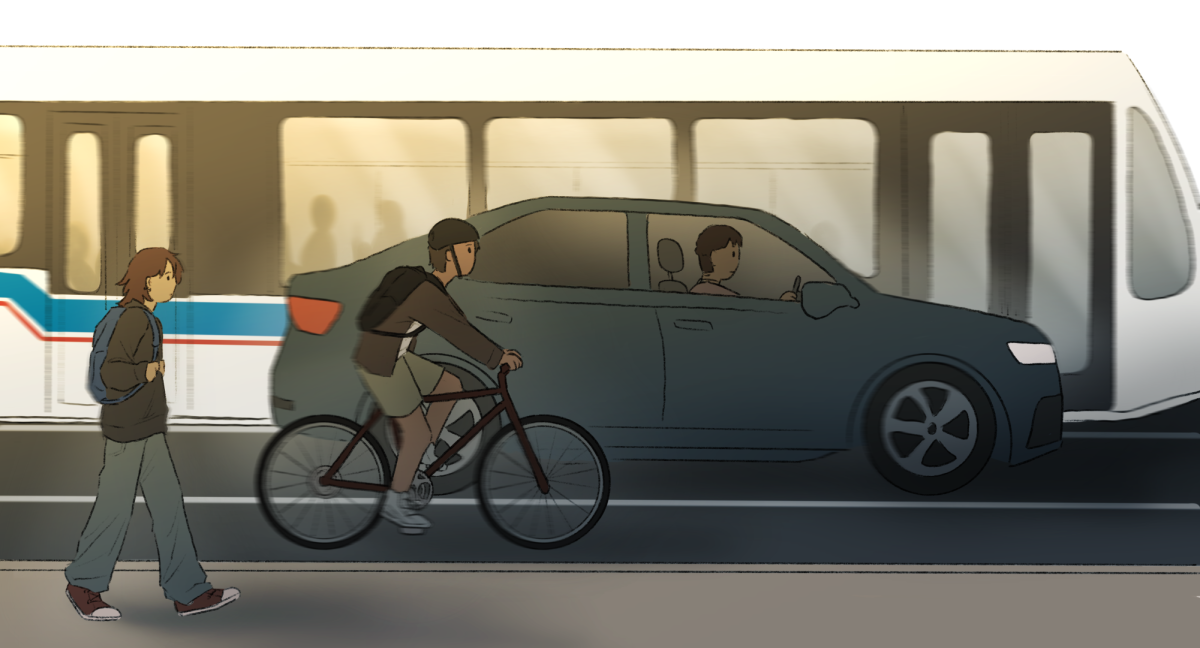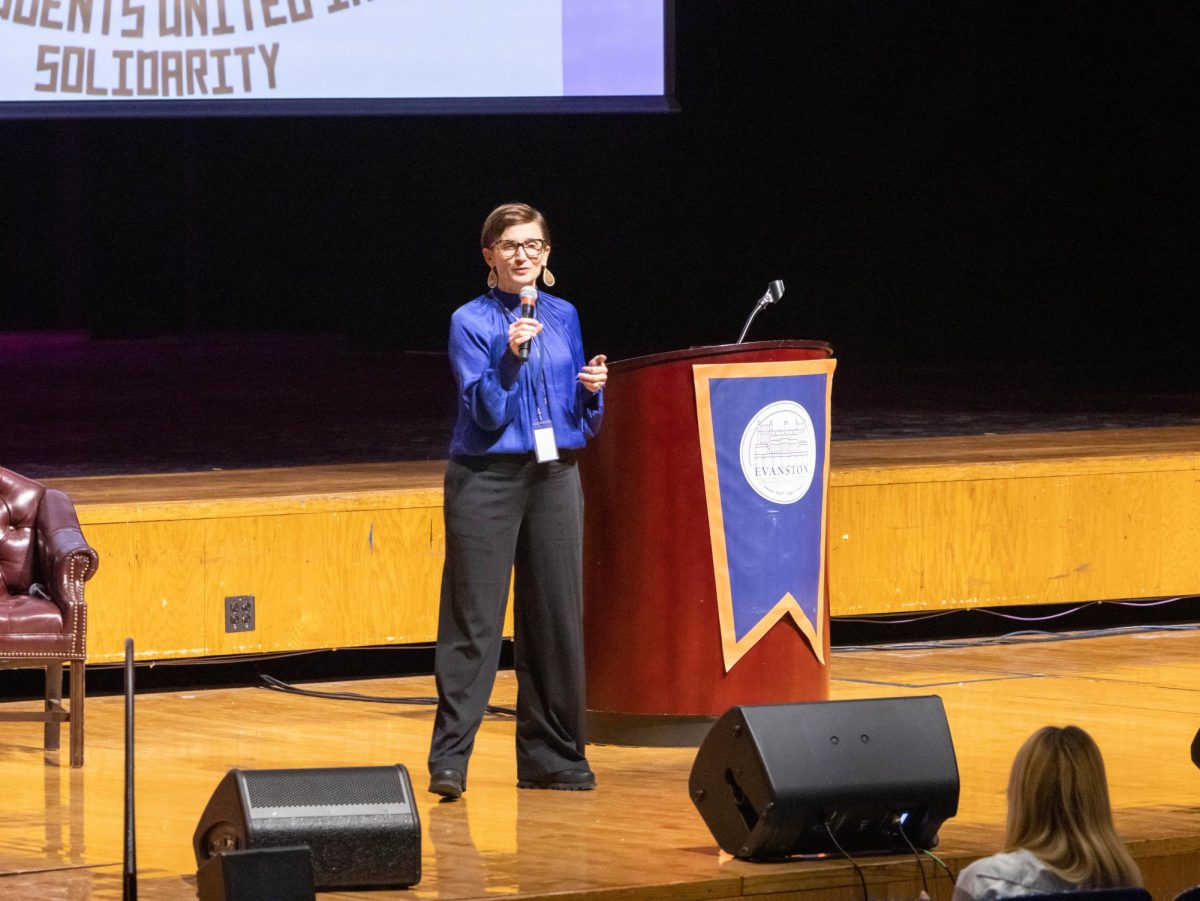Claire McFadden can make you laugh.
As a professional comedian who performs at Second City, Chicago’s premier improv and sketch institution, it’s her job.
McFadden is a member of Second City’s Mainstage ensemble which, for improv comedians, is a really big deal. The Mainstage ensemble is made up of some of the best improv comedians in Chicago and is often a launching pad for a long and successful comedy career. Keegan Michael Key, Bill Murray, Tim Robinson, Tina Fey and Chris Farley are just a few of the many comedy legends that were part of a Second City Mainstage cast.
As a Mainstage cast member, McFadden performs a mix of written sketches and improvised scenes to an eager audience of 290 people at Second City’s Mainstage Theater six nights a week.
But long before she was cracking up crowds on improv’s premier stage, McFadden spent her days in Evanston getting her first taste of improv and sketch comedy.
McFadden always liked to perform, acting in plays put on by Evanston Children’s Theater throughout her childhood. However, by the time she got to ETHS she decided to pursue other interests.
“In high school, I was like, ‘No, I’m gonna be an athlete. I don’t do theater,’” states McFadden.
She couldn’t leave performing behind completely, though, and she took theater as an elective her freshman year. While in the class, her natural comedic abilities shone through, impressing theater teacher Timothy Herbert.
“She was so funny. She was somebody who had a good deadpan reaction to me when I was over-expressive,” explains Herbert. “She would underplay, which is something that you really need in comedy. And then she was also able to be really kind of goofy and silly, too.”
Herbert was so wowed by McFadden that during parent-teacher conferences with her parents, he recommended that she audition for YAMO, the school’s annual student-run musical comedy revue.
Before Herbert had talked to her parents, McFadden had considered auditioning for YAMO but had been too scared. With her parents’ encouragement, she decided to go for it. Naturally, she got in, and she quickly became fully invested in the show.
“She had to quit soccer to do YAMO … and she never really left the theater,” says Herbert.
YAMO came with ups and downs for McFadden. She loved the feeling of performing and making audiences laugh, but she had to battle through severe stage fright prior to shows.
“I would not be able to eat, I would have a stomach ache, I would not be able to focus in class,” McFadden remarks. “[Beforehand] just sucked, but it was so fun to [perform].”
On stage experience was not the only thing she gained from her time in YAMO. She also learned how to properly write a comedy sketch, thanks to what she calls “a rigorous sketch education” from Mr. Herbert and theater technical director Aaron Carney.
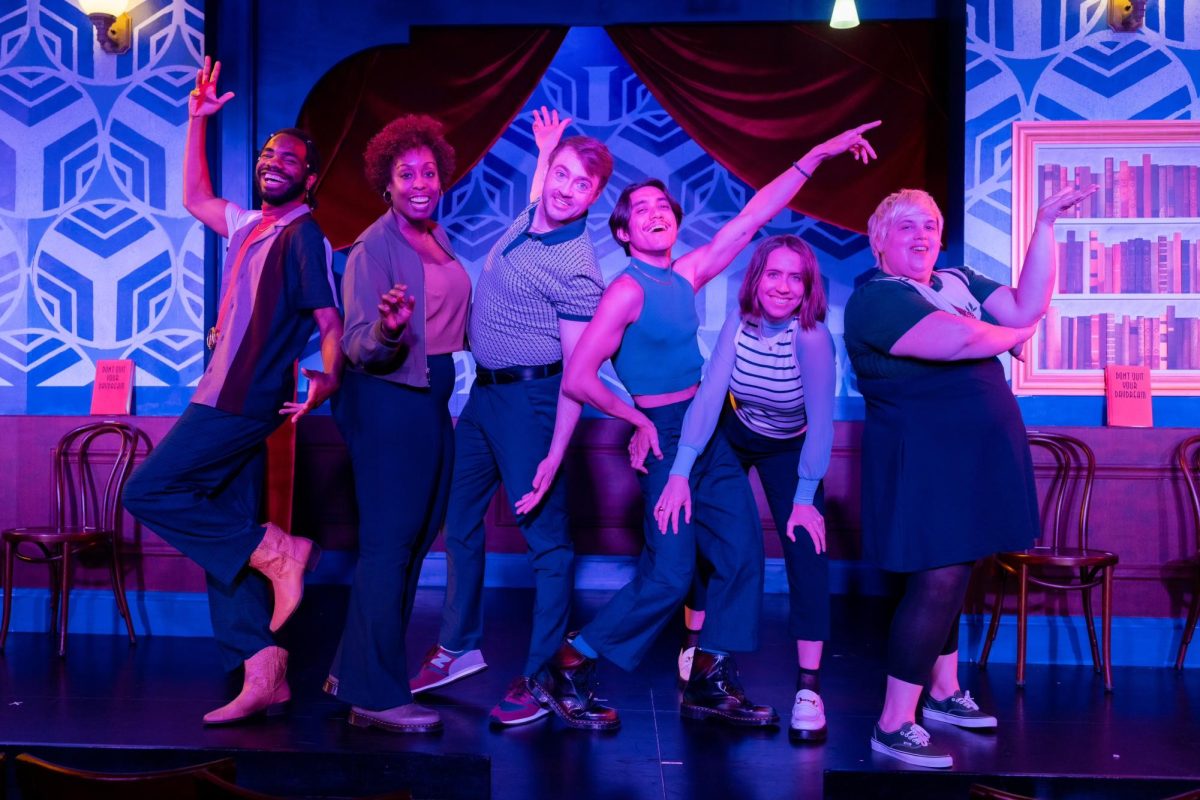
“Mr. Herbert and Mr. Carney were kind of hard on us…They really would edit your work and say, ‘You don’t need this,’ or ‘This isn’t a big enough laugh.’” McFadden describes. “They were sort of more rigorous than you’d usually experience at a high school level, so I think I got kind of good at thinking about sketch.”
This sketch writing experience, along with her natural comedic talents, paid off McFadden’s senior year when she wrote and acted in one a sketch that was, according to Herbert, not only “by far the best thing in show,” but one of the funniest YAMO sketches he has ever seen. McFadden originally wrote and directed the sketch, which revolved around an overdramatic teenage vlogger, for another student in the YAMO cast, but when the student was unable to perform in the sketch last-minute, McFadden had to get onstage herself. Although she hadn’t written the role for herself, she fit it perfectly and had the audience howling with laughter.
While getting her first experience with sketch comedy, McFadden was also introduced to improv, sketch’s wild, unpredictable cousin, after seeing a Second City show at age 14. She knew right away that she wanted to try it. Lucky for her, Evanston had its own student-run improv troupe called the Royal We which performed in local coffee shops. But during her first show with Royal We, McFadden was paralyzed with fear.
“I didn’t do a single thing in the show, except [in] a scene about chess [where] I stepped out as the queen. But in the rest of the 40 minute show I didn’t do a single thing. I just stood on the backline nervously,” McFadden remembers.
This is often the experience of beginner improvisers, especially when doing long form, a type of improv where performers come up with longer scenes as opposed to playing improv games. Stepping off the backline and initiating a scene requires a huge amount of confidence which usually comes as a result of hours of improv experience.
Eventually, after writing for YAMO for three years and continuing to perform with the Royal We, McFadden gained confidence in her writing and improv abilities and decided to continue to do comedy in college
“When you get good at something and it’s rewarding, you just want to keep doing it and get better,” McFadden explains. “When I was at freshman week at Carleton I saw [that the school had] an improv show and a sketch show, and then I just auditioned for both.”
During her first three years in college, McFadden considered comedy as a fun hobby but not as a career path. She was majoring in environmental studies and was applying for a more traditional job in Washington D.C. where she could work in politics to do environmental policy research. This all changed, however, when she returned home for Thanksgiving break her senior year and went to see Second City’s annual 24-hour show.
“You could tell the people on stage were really good friends, and I was very…jealous, and I just deeply wanted to switch places with them and be up there [on stage],” recounts McFadden.
Once McFadden saw the show, she completely reconsidered her direction in life.
“The feeling I got thinking about that job [in D.C.] was like, ‘Oh, I should do that.’ But then the feeling I got looking at the improvisers was like, ‘But I want to do that,’” McFadden describes. “So that’s when I kind of thought, ‘I’ll just move to Chicago and do a bunch of improv and sketch and then maybe I can get to that specific place [Mainstage].’”
With her sights set on a new goal of becoming a sketch and improv performer, McFadden finished college and moved to Chicago, where she enrolled in improv classes at iO and the Annoyance Theater, two of Chicago’s prominent improv theaters.
McFadden’s family was supportive of her new path and was glad that she would be living close by in Chicago, although they were concerned about the lack of paying jobs for comedians that are starting out. According to McFadden, however, that’s just how it works for a career in comedy.
“[When you’re starting out] you build up your skills and your portfolio and you do 1000 free shows and 1000 gigs, and you make your own short film, and you get other people to do it for free,” she details. “You do all this stuff which somehow, in an amorphous way, builds you up to put you in a position where you could get paying jobs.”
And that’s exactly what she did. By day, McFadden worked as a receptionist, coat check, picture framer, ticket taker and any other meaningless minimum wage job she could find. By night, she was an improv and sketch comedian doing free shows, making her own short films, and staging self-produced shows with her writing partner. These self-produced shows were imperative to McFadden’s improvement as a comedian. They taught her the ins and outs of creating a sketch and improv show and provided her with hours of onstage experience.
“Anytime you’re on stage, even if you completely bombed, and it sucked and there’s no audience, you can be like, ‘Well, I’m just doing my reps.’ And that’s how you kind of get good slowly,” McFadden illustrates.
She didn’t put on these shows just to get better at comedy, however. They were also fun and creatively fulfilling, and, to this day, still her favorite shows that she’s ever done.
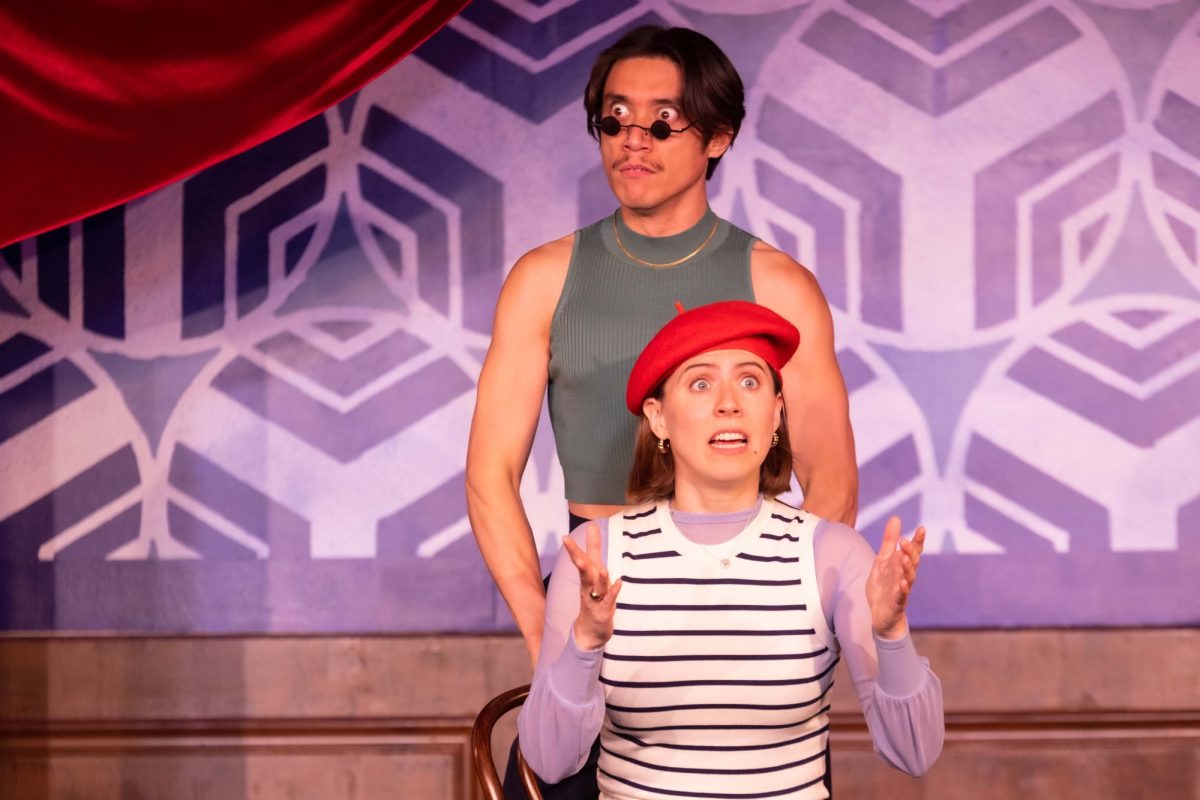
After four years of self-producing shows, McFadden got her first paying job in comedy as a writer at a videogame company called Jackbox Games. She was finally a professional comedian.
Soon, McFadden rose even higher in the improv community when she secured an audition at Second City after inviting casting directors and producers from Second City to some of her independent shows. She didn’t make it into Second City’s casting pool on her first try, but following a few more auditions, she was let in as an understudy. After two years as an understudy, she was moved up to Second City’s touring company.
About twice a month, the touring company would travel to a smaller town with a less established comedy scene and perform improv for the community. McFadden enjoyed the frenetic pace of the company at each stop.
“It’s really fun…You get to the theater at four, and you have to tech your show, and then you go back to the hotel, then you go and you do your show, and then you go to a random bar in this random town and then you leave the next day,” McFadden describes.
Performing in smaller towns came with its challenges. Many audience members had no idea what they were in for when they went to see the shows, and political material performed by the liberal members of the touring company did not go over well with them.
“Sometimes in red states [the audience] actively disliked us and would walk out of the theater,” recalls McFadden.
Crowds on the touring company’s stops also didn’t laugh as easily as some of the audiences back in Chicago. This could be frightening for the cast, but it ultimately strengthened them as performers.
“It’s a muscle to not give up on scenes if it’s silent in the room or to try to win a crowd back,” says McFadden. “So often, the crowd would be very quiet for like the first half and you’d think, ‘they just don’t like [the show],’ but they would slowly warm up and then we would get a standing ovation at the end.”
McFadden performed with the touring company for two years before getting brought up to the Mainstage cast where she has been for the past two revues, “Do the Right Thing, No Worries if Not,” and “Don’t Quit Your Daydream.” Mainstage revues are created and performed in a never-ending loop. During an intense three-month period, the cast spends most of their time in the theater, writing and rehearsing sketches for the new revue during the day and performing the current revue at night. Slowly, new sketches replace current sketches until an entirely new show is formed and officially debuted. This new show runs for nine months before it’s replaced. It’s an exhausting experience that takes a lot out of the Mainstage cast.
“Once we’re running the show, life is good, but during the intense period, it is kind of all-consuming. I’m like a shell of myself,” McFadden expresses.
Although the hours are demanding, this is the part of the job she enjoys the most.
“My favorite thing is that we get to make the show, and even though the process is the most difficult part of the year, it is the most satisfying,” McFadden confesses. “I’m just non-stop thinking of stuff, and I love constructing sketches.”
Here, McFadden’s sketch writing skills that she first learned from Herbert during her days in YAMO and then honed while creating her self-produced shows can really shine.
“Claire is very good at riffing different joke options in a particular scene, like coming up with a bunch of different possibilities very quickly,” comments McFadden’s Mainstage castmate, Andy Bolduc. “She’s also very good at sniffing out what a workable comedic structure would look like. … She has a very good sense for comedic ideas that can be expanded into entire sketches.”
Not only are her sketches hilarious and well-developed, they also provide opportunities for any member of the cast to be involved.
“When she writes, she writes with the intention of focusing on the funny of the scene, not on, ‘This can only be played by this character,’ states Julia Morales, another one of McFadden’s Mainstage castmates. “She makes it very inclusive. And it’s helpful because we need more diversity in our sketches.”
These sketches are all performed in front of audiences that are excited to be there and ready to laugh–maybe even a little too ready.
“It’s almost like taking candy from a baby, you know? When I first started performing at Second City, I was like, ‘Oh my God. I can say anything and get a laugh,’” McFadden states.
This can be a dangerous trap for a comedian, and McFadden has to remind herself to stay true to her scrappy comedy origins.
“You don’t want to lower your bar based on knowing that, ‘If I just do a British accent, I’ll get a laugh here,” she describes. “Whereas if you’re doing an improv show in the back of a bar, which I’ve done so many times, and there’s 12 people watching, you are not going to get even a little laugh.”
Although the audiences are forgiving, the rigorous performing schedule is not. The Mainstage cast puts on eight shows a week, six nights a week, every single week. McFadden spends most of her time on stage, as she puts it, “yelling and growling,” and without any formal acting training to help her master this skill, it takes a physical toll.
“I’m not a trained actor. The only theater class I’ve ever taken was with Mr. Herbert [at ETHS],” McFadden says. “So I’m just winging it out there. … My voice is kind of raw because I’ve done seven shows [this week].”
In order to recover and make sure she’s ready for her next performance, McFadden sleeps ten hours per night. Who knew being a comedian was this physically challenging?
While it can be difficult for her body to keep up with the tough schedule, it’s not quite as taxing on her mind. The sketches, done night after night for months, become second nature to perform.
“[When you’re] doing the sketches for like the 200th time you can kind of accidentally stop paying attention,” McFadden explains. “Sometimes I’ll be on stage talking, and in my head I’m completely thinking about something else.”
Although the sketches don’t provide much room for variation, McFadden changes things whenever she can, delighting the rest of the cast in the process.
“There was a part [of a sketch in our last revue] where Claire had to sing ‘Firework’ by Katy Perry. And listening to Claire belt out that song every night for over 300 shows… Sometimes she went a little too high in her voice. Sometimes she went low. Sometimes she was off beat,” recounts Morales. “We [her cast mates] did everything in our power to try not to break out in laughter. I’d have to hide my head in [somebody]’s shoulder or turn my head completely around as she was singing. … She’s a wild card, and we never knew what we were gonna get,
The improvised section of the show is where McFadden really gets to put her creativity, physicality, and oddball sensibilities on display.
“She makes really big choices [while improvising], and it’s fun to watch her. She loves physical comedy, and that is really refreshing. She likes to play characters that are truly not from this world. … I don’t know where her characters come from, to be honest, but they’re very funny and they’re very wild,” describes Morales. “Watching her hunch her back over and play the most bizarre wizard or old man or some sort of creature, there are times where I just end up forgetting to tag out or sweep because I’m paying attention and laughing at whatever bizarre thing she has created in an improv scene.”
McFadden is also a great team player, energetically supporting the other performers in any scene they come up with.
“She’s down to play. I think that’s a really good thing that all great improvisers need. … When Claire is having a good time she has a real positive energy that infects everybody else,” Bolduc expresses. “She listens well, hears what her scene partners are saying and doing and responds to those things with a lot of enthusiasm. So that makes you feel [very supported] on stage with her. She’s excited to explore other people’s ideas.”
McFadden has always had a collaborative attitude, something that Mr. Herbert noticed when he attended one of her Mainstage shows 15 years after she graduated from ETHS.
“She’s a great listener. On stage, she does that deadpan beautifully. … I see her as a great onstage partner, and I saw her do that [at ETHS] for years.”
This March will mark the end of McFadden’s second year as a Mainstage performer, and it might also be the end of her time at Second City. She’s still deciding whether to stay for another year or move to New York City or LA, the cities where a comedian’s career can really take off. She hopes that someday she can create her own sketch show like Tim Robinson’s “I Think You Should Leave,” but dreams of fame and money are not what motivate her; it’s the joy of creating.
“I would still be self producing shows if I hadn’t gotten those jobs [at Jackbox Games and Second City], and when I leave Mainstage I’m gonna self-produce shows again. It’s complete creative freedom.” McFadden expresses. “[That’s] the fun part [of comedy]: getting to do what you want to do and having people see it and laugh.”



